In project management, one of the most common challenges you face is the delicate balance of resources. Whether you’re dealing with a lack of available team members or trying to avoid the chaos of over-allocation, managing resource availability can often feel like a juggling act. You might find yourself competing with other project managers for the same key people, or worrying that a sudden shift in availability could derail your deadlines.
In this article, we’ll explore the concept of resource availability in project management, break down how to track and calculate it and discuss strategies to help you protect your team and keep your projects on course.
Resource availability definition
Resource availability in project management refers to the extent to which a resource (such as a team member, equipment, or budget) is available to work on a project. It is a crucial element in ensuring that the right resources are allocated to the right tasks at the right time. When resources are unavailable, it can delay the project, reduce productivity, and lead to missed deadlines.
How to calculate resource availability in project management
To calculate resource availability in project management, you can use the following formula:
Resource Availability (%) = (Available Hours / Total Hours) × 100
Where:
- Available Hours: The number of hours a resource is free to work on your project.
- Total Hours: The total working hours within a specific period.
Example: If a resource is available for 30 out of 40 hours in a week, their availability is (30/40) × 100 = 75%. This percentage helps project managers understand how much capacity a resource has for taking on new tasks.
Benefits of tracking resource availability in project management
Tracking resource availability in project management offers several benefits:
- Improved planning
By knowing resource availability in advance, project managers can allocate tasks more effectively, ensuring that every resource is adequately utilized.
- Better project outcomes
Projects are more likely to meet deadlines when resource availability is regularly monitored, as it reduces the chances of bottlenecks.
- Informed decision-making
Understanding the availability of resources enables project managers to make more informed decisions about task assignments, deadlines, and even whether to take on additional projects.
- Cost efficiency
Avoiding over-allocation or under-utilization of resources can lead to cost savings, as resources are used efficiently without causing delays or overtime costs.
Project resource availability and competing for resources
If your project team is working within a larger project management department, then you are probably sharing resources with other project managers. Resource availability in project management is essential here, as the same resource might be allocated to multiple projects. Sharing in this context is a misnomer, because resources are given specific assignments, and cannot usually work on other projects concurrently. If another project manager wants to use your resource, they will have to either wait their turn or appeal to management for a restructuring.
When that happens, you will probably have to defend your team’s composition. Some project management offices do this as part of a regular process, be it daily, weekly, or monthly, where team assignments are shuffled around based on where they are most needed. If you‘re not careful, you could end up being stripped of a vital team member at a critical moment due to resource availability constraints.
How to use Birdview to track resource availability
To prevent any resource availability constraints, you need to go into meetings organized and prepared. This is when resource management software such as Birdview comes in handy. Here are a few things you should have ready:
Task List
The point of a resource assessment meeting is to determine who is being used for what, and if they can be freed up and reassigned elsewhere. Bring in a complete task list or resource-loading report for every single one of your team members to show that they are necessary for you to meet your deadlines. Resource availability in project management can shift, and you‘ll want to demonstrate that all of your resources are fully utilized.
Birdview‘s “My Assignment” feature can be particularly useful here, allowing you to have a clear, up-to-date view of each team member‘s tasks and responsibilities. Bring a separate list of future tasks as well, so that the other project managers will know that your team members have other important tasks coming down the line. If you can bring a task list that shows inter-dependencies, all the better.
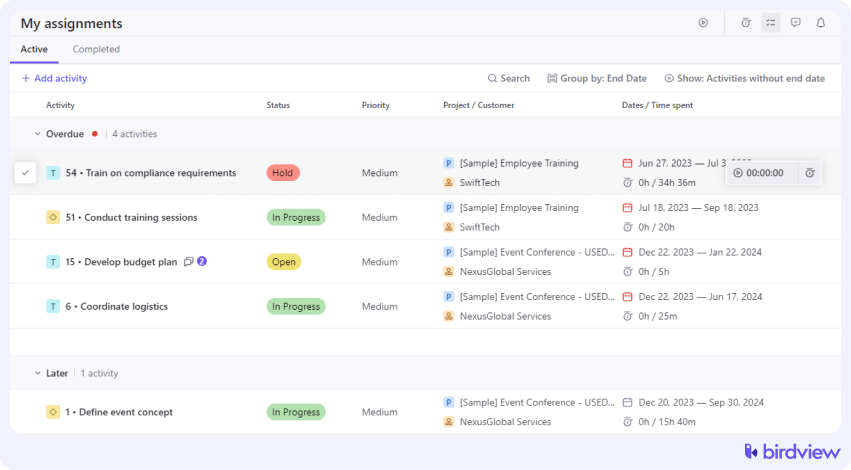
Birdview also offers a smart resource allocation tool to help you assign the right people to the right tasks. Based on real-time data, you can make informed decisions about who to allocate to each task, ensuring that no one is overwhelmed while others remain underutilized. This helps maximize resource efficiency and ensures balanced workloads.
Risk Assessment
If you want to keep your team intact, you have to show your manager (and the other PMs) how the loss of one will affect the rest of the team. A Gantt chart can provide an excellent visual representation of your team members’ activities and the dependencies associated with them. Birdview‘s Gantt Chart feature is perfect for this, as it visually maps out the project‘s tasks, dependencies, and timelines, making it easier to highlight potential risks if a resource is reassigned. Be sure and include dates and deliverables in your risk assessment report, and how these changes will affect the client.
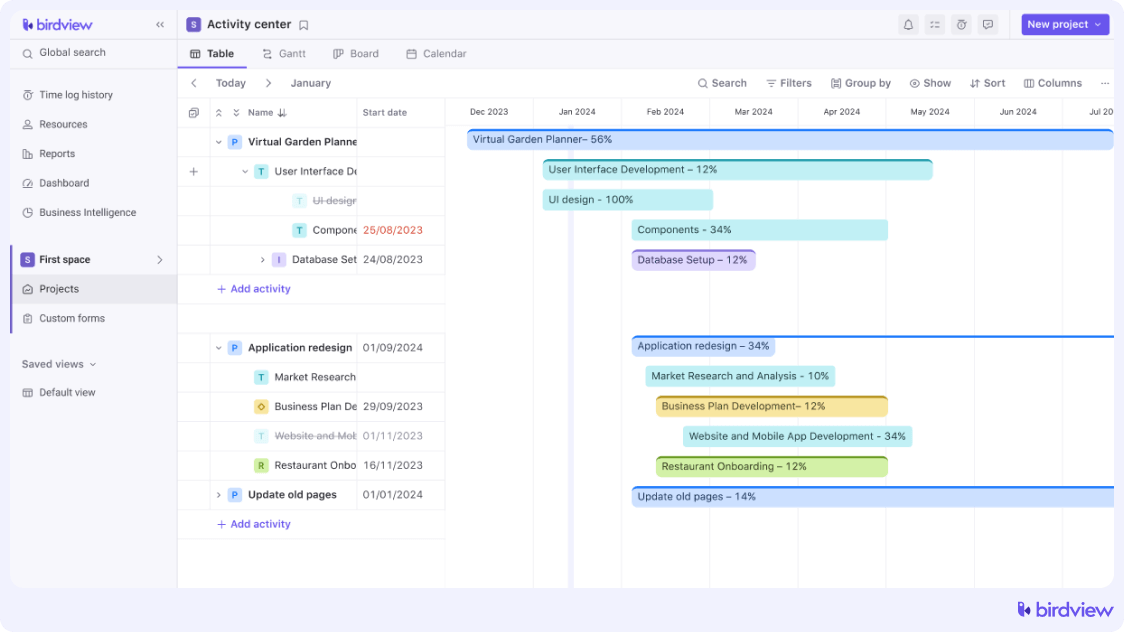
Read more:
Birdview also provides a centralized resource dashboard where you can view all your team members and their current assignments. This feature allows you to see at a glance who is available, who is overbooked, and who has the capacity for more tasks. You can easily filter by roles, teams, or specific projects to get the most relevant insights.
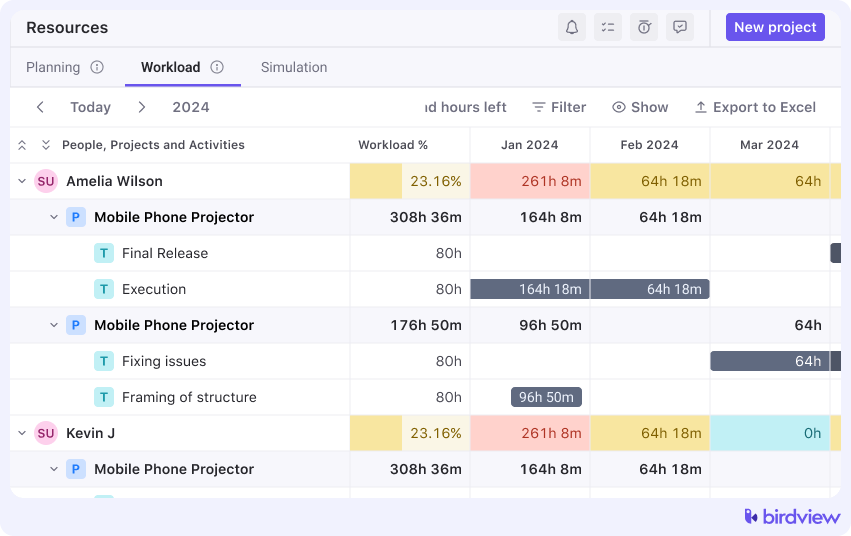
Establish an ETA
You can fight as hard and as long as you want, but you will have to give up your team members eventually. What the above points are trying to do is to help you keep them through the critical period. Resource availability in project management is fluid, and this means compromises are sometimes necessary. You may be fostering teamwork within your own group, but you also have to do so within the larger organization. And that means compromises.
Set an estimated date or period when the team member in question will be able to safely switch projects. Utilizing Birdview‘s resource allocation tools can be especially helpful here, as it allows you to see when resources are tied up and when they will be available again.
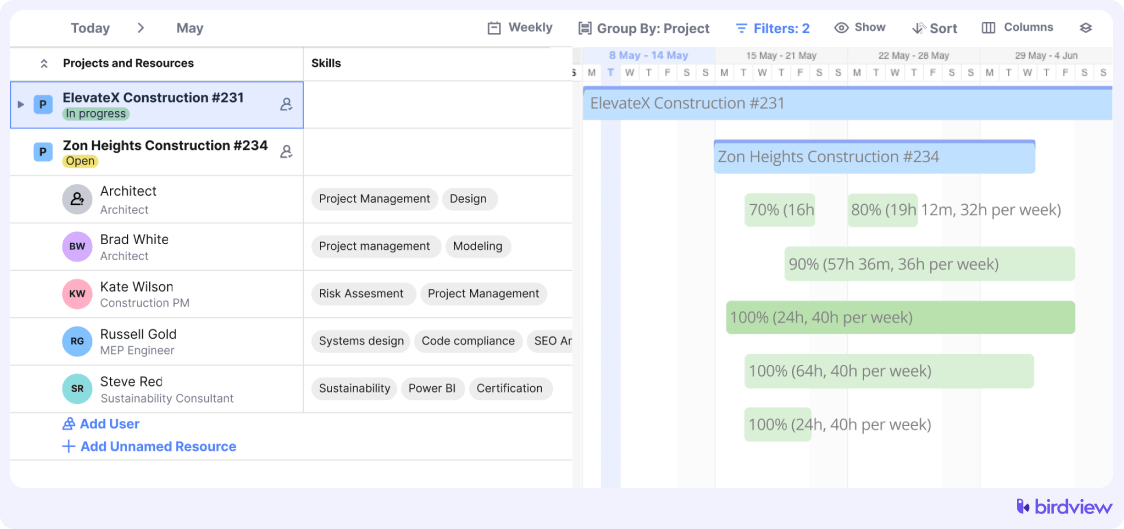
If that is not good enough for the requesting project manager, work with them to reach an effective date that will work. Timeline views or calendars can visually map out these estimates, making it easier to communicate availability to other managers.
Think outside the box if you need to, such as trading one specialization for another, so there will not be a net loss of manpower on either end. You can also rely on workload balancing tools to ensure resources are not being overburdened, and task dependency tracking to understand the impact of shifting resources between projects.
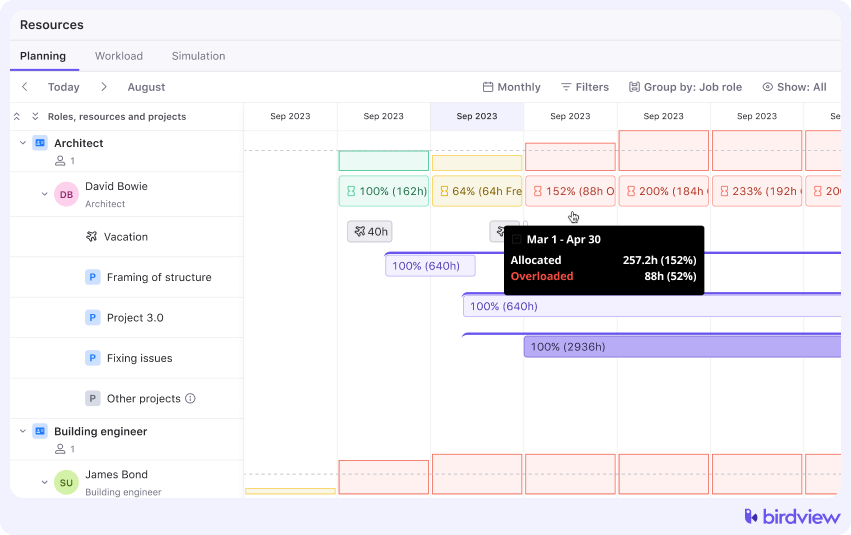
Even if the situation doesn’t work out for you, and you do end up losing vital resources, remember that these are not your team members: they’re the company’s. Management is doing its best to balance resource availability in project management so that every project becomes a success, not just one. Keep this perspective and allow your fellow project manager this favor.
Because next meeting, it’ll be your turn.
Track time
With Birdview‘s time tracking features, you can see how much time each team member has spent on their tasks compared to the hours they have available. These capabilities give you a more accurate picture of workload distribution and resource availability, ensuring that deadlines are met without overwhelming your team.
Get insights into resource availability
Understanding resource availability is key to keeping your projects on track. By using Birdview‘s reports and dashboards, you can gain real-time insights into who‘s available, when, and for how long. These reports help you make data-driven decisions, plan ahead, and avoid bottlenecks. With detailed visibility into resource allocation, you can ensure your team is always operating efficiently and that your projects stay on course.
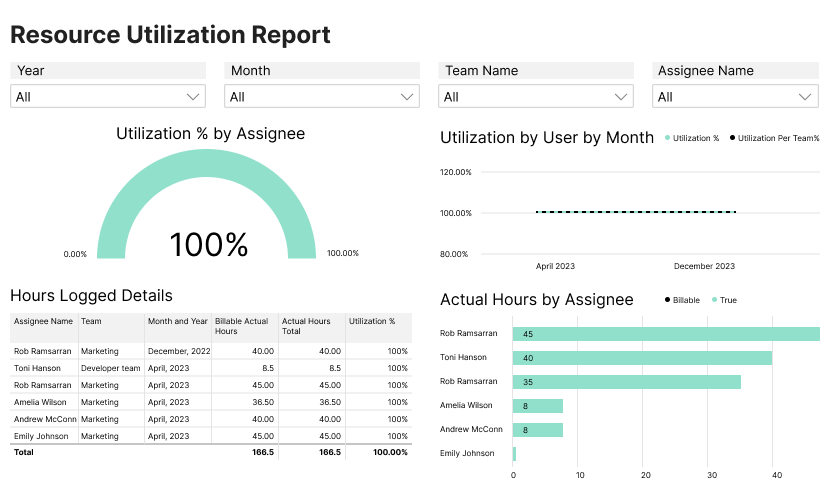
Related resource management content
If you’re looking to dive deeper into effective resource management strategies, we have more helpful materials on our website. You’ll find plenty of practical advice to keep your projects running smoothly.



